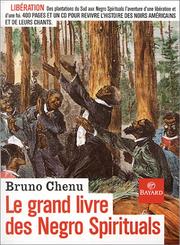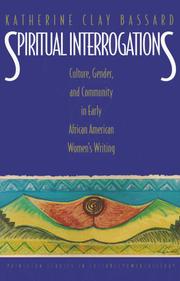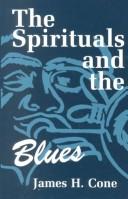| Listing 1 - 4 of 4 |
Sort by
|

ISBN: 2227299061 9782227299061 Year: 2000 Publisher: Paris : Bayard,
Abstract | Keywords | Export | Availability | Bookmark
 Loading...
Loading...Choose an application
- Reference Manager
- EndNote
- RefWorks (Direct export to RefWorks)
Spirituals (Songs) --- Slaves --- Negro spirituals --- Esclaves --- History and criticism --- Social conditions --- Religious life --- Histoire et critique --- Conditions sociales --- Vie religieuse --- Spirituals (Songs) - History and criticism --- African Americans - Music - History and criticism --- Enslaved persons --- Religious life. --- Social conditions. --- African Americans
Book
ISBN: 2130457045 9782130457046 Year: 1993 Volume: 2791 Publisher: Paris PUF
Abstract | Keywords | Export | Availability | Bookmark
 Loading...
Loading...Choose an application
- Reference Manager
- EndNote
- RefWorks (Direct export to RefWorks)
Music --- Spirituals (Songs) --- Negro Spirituals --- History and criticism --- Histoire et critique --- Gospel music --- African Americans --- History and criticism. --- -Gospel music --- -African Americans --- -784 <44> --- Afro-Americans --- Black Americans --- Colored people (United States) --- Negroes --- Africans --- Ethnology --- Blacks --- Popular music --- Sacred songs --- -History and criticism --- Negro spirituals --- 784 <44> --- Music&delete& --- African American songs --- 78.39.1 --- Black people --- Spirituals (Songs) - History and criticism. --- Gospel music - History and criticism. --- African Americans - Music - History and criticism. --- Musique gospel

ISBN: 1282753444 9786612753442 1400822599 069101647X 1400800374 1400815045 Year: 1999 Publisher: Princeton Princeton University Press
Abstract | Keywords | Export | Availability | Bookmark
 Loading...
Loading...Choose an application
- Reference Manager
- EndNote
- RefWorks (Direct export to RefWorks)
The late eighteenth century witnessed an influx of black women to the slave-trading ports of the American Northeast. The formation of an early African American community, bound together by shared experiences and spiritual values, owed much to these women's voices. The significance of their writings would be profound for all African Americans' sense of their own identity as a people. Katherine Clay Bassard's book is the first detailed account of pre-Emancipation writings from the period of 1760 to 1863, in light of a developing African American religious culture and emerging free black communities. Her study--which examines the relationship among race, culture, and community--focuses on four women: the poet Phillis Wheatley and poet and essayist Ann Plato, both Congregationalists; and the itinerant preacher Jarena Lee, and Shaker eldress Rebecca Cox Jackson, who, with Lee, had connections with African Methodism. Together, these women drew on what Bassard calls a "spirituals matrix," which transformed existing literary genres to accommodate the spiritual music and sacred rituals tied to the African diaspora. Bassard's important illumination of these writers resurrects their path-breaking work. They were cocreators, with all black women who followed, of African American intellectual life.
African American women -- Intellectual life. --- African American women -- Religious life. --- African American women in literature. --- American literature -- 19th century -- History and criticism. --- American literature -- African American authors -- History and criticism. --- American literature -- Women authors -- History and criticism. --- Christianity and literature -- United States. --- Community life in literature. --- Religion and literature -- United States. --- Spiritual life in literature. --- Spirituals (Songs) -- History and criticism. --- Wheatley, Phillis, 1753-1784 -- Religion. --- Women and literature -- United States.

ISBN: 0883447479 9780883447475 Year: 1991 Publisher: Maryknoll Orbis Books
Abstract | Keywords | Export | Availability | Bookmark
 Loading...
Loading...Choose an application
- Reference Manager
- EndNote
- RefWorks (Direct export to RefWorks)
African Americans --- Spirituals (Songs) --- Blues (Music) --- Music --- History and criticism. --- Religion. --- -Music --- -Spirituals (Songs) --- -African Americans --- Afro-Americans --- Black Americans --- Colored people (United States) --- Negroes --- Africans --- Ethnology --- Blacks --- Art music --- Art music, Western --- Classical music --- Musical compositions --- Musical works --- Serious music --- Western art music --- Western music (Western countries) --- History and criticism --- -History and criticism --- Religion --- -Africans --- Music&delete& --- Black people --- African Americans - Music - History and criticism. --- Spirituals (Songs) - History and criticism. --- Blues (Music) - History and criticism. --- Music - United States - History and criticism. --- African Americans - Religion.
| Listing 1 - 4 of 4 |
Sort by
|

 Search
Search Feedback
Feedback About UniCat
About UniCat  Help
Help News
News